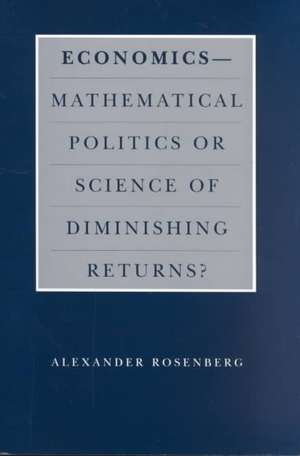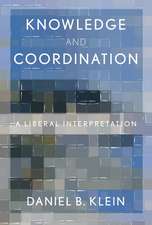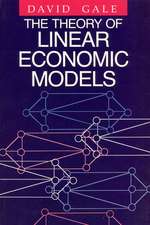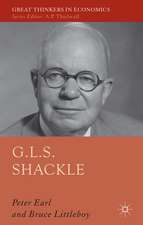Economics--Mathematical Politics or Science of Diminishing Returns?: Science and Its Conceptual Foundations series
Autor Alexander Rosenbergen Limba Engleză Paperback – 31 aug 1994
Economics today cannot predict the likely outcome of specific events any better than it could in the time of Adam Smith. This is Alexander Rosenberg's controversial challenge to the scientific status of economics. Rosenberg explains that the defining characteristic of any science is predictive improvability—the capacity to create more precise forecasts by evaluating the success of earlier predictions—and he forcefully argues that because economics has not been able to increase its predictive power for over two centuries, it is not a science.
Din seria Science and Its Conceptual Foundations series
-
 Preț: 230.35 lei
Preț: 230.35 lei -
 Preț: 455.04 lei
Preț: 455.04 lei -
 Preț: 431.17 lei
Preț: 431.17 lei -
 Preț: 288.59 lei
Preț: 288.59 lei -
 Preț: 294.80 lei
Preț: 294.80 lei -
 Preț: 231.00 lei
Preț: 231.00 lei -
 Preț: 191.68 lei
Preț: 191.68 lei -
 Preț: 443.89 lei
Preț: 443.89 lei -
 Preț: 358.60 lei
Preț: 358.60 lei -
 Preț: 301.88 lei
Preț: 301.88 lei -
 Preț: 498.55 lei
Preț: 498.55 lei -
 Preț: 392.61 lei
Preț: 392.61 lei -
 Preț: 352.99 lei
Preț: 352.99 lei -
 Preț: 347.24 lei
Preț: 347.24 lei -
 Preț: 320.04 lei
Preț: 320.04 lei -
 Preț: 448.30 lei
Preț: 448.30 lei -
 Preț: 389.89 lei
Preț: 389.89 lei -
 Preț: 317.33 lei
Preț: 317.33 lei -
 Preț: 496.35 lei
Preț: 496.35 lei -
 Preț: 435.78 lei
Preț: 435.78 lei -
 Preț: 401.43 lei
Preț: 401.43 lei -
 Preț: 447.32 lei
Preț: 447.32 lei -
 Preț: 387.98 lei
Preț: 387.98 lei -
 Preț: 233.11 lei
Preț: 233.11 lei -
 Preț: 385.65 lei
Preț: 385.65 lei -
 Preț: 331.75 lei
Preț: 331.75 lei -
 Preț: 270.07 lei
Preț: 270.07 lei -
 Preț: 268.20 lei
Preț: 268.20 lei - 15%
 Preț: 194.45 lei
Preț: 194.45 lei - 22%
 Preț: 689.51 lei
Preț: 689.51 lei - 23%
 Preț: 583.39 lei
Preț: 583.39 lei - 10%
 Preț: 306.24 lei
Preț: 306.24 lei - 15%
 Preț: 264.92 lei
Preț: 264.92 lei
Preț: 274.82 lei
Nou
Puncte Express: 412
Preț estimativ în valută:
52.58€ • 55.20$ • 43.65£
52.58€ • 55.20$ • 43.65£
Carte tipărită la comandă
Livrare economică 10-24 aprilie
Preluare comenzi: 021 569.72.76
Specificații
ISBN-13: 9780226727240
ISBN-10: 0226727246
Pagini: 283
Ilustrații: 1 table
Dimensiuni: 152 x 229 x 23 mm
Greutate: 0.39 kg
Ediția:1
Editura: University of Chicago Press
Colecția University of Chicago Press
Seria Science and Its Conceptual Foundations series
ISBN-10: 0226727246
Pagini: 283
Ilustrații: 1 table
Dimensiuni: 152 x 229 x 23 mm
Greutate: 0.39 kg
Ediția:1
Editura: University of Chicago Press
Colecția University of Chicago Press
Seria Science and Its Conceptual Foundations series
Cuprins
Preface
Ch. 1: What Does the Philosophy of Science Have to Do with Economics?
The real relation between philosophy and science
The mutual constraints of goals, theories, and rules
The proximate goals of economics
Ch. 2: Two Dead Ends in the Philosophy of Economics
Does philosophy constrain economics?
Economics without epistemology
The role of prediction in biology, physics, and economics
Ch. 3: Is Economic Theory Predictively Successful?
Friedman on the predictive weakness of economic theory
Leontief on the same subject
Are generic predictions enough?
Generic predictions in Keynesian macroeconomics and rational expectations theory
Gibbard and Varian on economic models as caricatures
Ch. 4: Neoclassical Economics as a Research Program
The methodology of scientific research programs
Lakatosian consolations for economists
Research programs and the demarcation problem
Down the slippery slope to McCloskey
Ch. 5: Economics and Intentional Psychology
Expectations and preferences, beliefs and desires
The problem of improvability
Economics and linguistics: Nelson's gambit
Are there expectations and preferences?
Conclusion
Ch. 6: Could Economics Be a Biological Science?
The problem of exogenous tastes
Becker's new theory of consumer choice
Stable preferences as human needs
Can we "naturalize" information?
Generic predictions and the temptation of biology
Darwin, Friedman, and Alchain
Equilibrium and information in evolution and economics
Conclusion
Ch. 7: Why General Equilibrium Theory?
"Economics just is general equilibrium analysis"
Can we have partial equilibrium without general equilibrium?
What needs explanation? Can general equilibrium theory explain it?
General equilibrium and the social contract
Are generic predictions enough after all?
Ch. 8: Is Economic Theory Mathematics?
Extremal theories and intentionality
Economics as applied mathematics
Microeconomics and Euclidean geometry
But is it science?
Bibliography
Index
Ch. 1: What Does the Philosophy of Science Have to Do with Economics?
The real relation between philosophy and science
The mutual constraints of goals, theories, and rules
The proximate goals of economics
Ch. 2: Two Dead Ends in the Philosophy of Economics
Does philosophy constrain economics?
Economics without epistemology
The role of prediction in biology, physics, and economics
Ch. 3: Is Economic Theory Predictively Successful?
Friedman on the predictive weakness of economic theory
Leontief on the same subject
Are generic predictions enough?
Generic predictions in Keynesian macroeconomics and rational expectations theory
Gibbard and Varian on economic models as caricatures
Ch. 4: Neoclassical Economics as a Research Program
The methodology of scientific research programs
Lakatosian consolations for economists
Research programs and the demarcation problem
Down the slippery slope to McCloskey
Ch. 5: Economics and Intentional Psychology
Expectations and preferences, beliefs and desires
The problem of improvability
Economics and linguistics: Nelson's gambit
Are there expectations and preferences?
Conclusion
Ch. 6: Could Economics Be a Biological Science?
The problem of exogenous tastes
Becker's new theory of consumer choice
Stable preferences as human needs
Can we "naturalize" information?
Generic predictions and the temptation of biology
Darwin, Friedman, and Alchain
Equilibrium and information in evolution and economics
Conclusion
Ch. 7: Why General Equilibrium Theory?
"Economics just is general equilibrium analysis"
Can we have partial equilibrium without general equilibrium?
What needs explanation? Can general equilibrium theory explain it?
General equilibrium and the social contract
Are generic predictions enough after all?
Ch. 8: Is Economic Theory Mathematics?
Extremal theories and intentionality
Economics as applied mathematics
Microeconomics and Euclidean geometry
But is it science?
Bibliography
Index

















